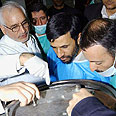
Ahmadinejad at uraniul enrichment plant in Natanz (Archives)
Photo: AFP
Iran may be close to exhausting its supplies of uranium oxide and lacks the resources to sustain processing and enrichment activities for a civilian nuclear program, a US think tank said on Thursday.
Self-Reliance
Associated Press
Ayatollah Khamenei says US, UN sanctions forced Iran to become more self-reliant
The Washington-based Institute for Science and International Security (ISIS) said in a study that Iran does not seem to have obtained significant amounts of uranium oxide or "yellow cake" since it acquired 600 tons from South Africa in the 1970s.
The analysts estimate Iran has used some three-quarters of the South African supply, basing their estimates on a November 2008 report from the International Atomic Energy Agency (IAEA).
The lack of supply raises more doubts about the nature of Iran's nuclear program, the analysts said, because the shortfall would be an obvious obstacle for a civilian program, but not a military one.
"The current uranium ore shortfall illustrates a fundamental inconsistency between Iran's stated intentions - a commercially viable, indigenously fuelled, civil nuclear power industry - and its capabilities," the analysts said.
Some Western analysts believe Iran will have enriched enough uranium by later this year to make a bomb if it wishes. A lack of yellow cake would not be an obstacle to a weapons program, which requires much less uranium ore than a civilian one.
A Western diplomat close to the IAEA said the report's findings looked plausible. "I have heard that the South African material has come to an end," the diplomat said.
'No scientific basis'
Tehran says it is enriching uranium only for a civilian nuclear program to generate electricity. But its record of nuclear secrecy and curbs on IAEA inspections have stirred Western suspicions of an illicit quest for atom bombs and it has been targeted by three sets of United Nations sanctions.
Exports of yellow cake to Iran are banned under the UN resolutions, which prevent exports of materials and technology for Iranian enrichment.
The enriched uranium required for use in nuclear reactors or weapons is produced in centrifuges that spin uranium hexafluoride gas (UF6) at high speeds. The UF6 is derived in a chemical reaction from yellow cake, a concentrate obtained from mined uranium ore.
The IAEA said in its latest report in November that Iran had not boosted the number of centrifuges regularly refining uranium since reaching a level of 3,800 in September. The reason for its relatively slow progress was unclear according to UN officials.
David Albright, one of the authors of the ISIS study, said a lack of yellow cake would not be the reason for the slow progress.
"They are making progress but not progressing as a European country would. They don't seem to have the urgency and they are not as capable in technical terms," he said, although he estimates Iran could have the ability to produce a weapon this summer.
An absence of activity at one of Iran's two uranium mines casts doubt on Tehran's assertions it can establish independence in the fuel cycle required for a civil nuclear energy program, the ISIS report said.
On Wednesday, Iran dismissed a separate news report that it is running short of yellow cake uranium. "Such news has been raised by the media with no scientific basis," Foreign Ministry spokesman Hassan Qashqavi told a news conference when asked about the report in The Times newspaper.
"The news has been the product of a few analyses and guesswork and articles."















